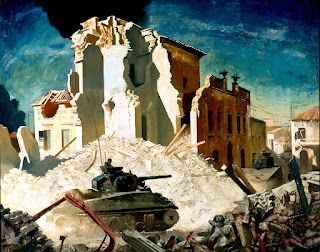Eighty years ago this week the allies make only slow headway against the Germans in the Ukraine and in Italy
The northernmost of the sequence of German defensive "winter" lines in Italy rested on the Adriatic port city Ortona. The crossing of the Sangro futher south had been relatively easy but the Germans defended Ortona ferociously against the Canadian 1st Infantry Division. The house-to-house fighting was especially bloody and Ortona came to be called the Stalingrad of Italy.
After liberating Kyiv the previous month, the Red Army was subjected to a ferocious German counter-attack. The Soviets were able to send urgent reinforcements to the front which halted the Germans but the two armies had fought each other to a standstill. Each had suffered heavy casualties but neither had achieved a major strategic victory in which major opposing formations were eliminated. The German army was firmly on the back-foot but still a formidable opponent.
RAF Bomber Command suffered what came to be called Black Thursday when it mounted a raid on Berlin as part of AM Harris's campaign to destroy the city. 23 of the 483 attacking Lancasters were shot down over hostile territory; 4.7% casualties was considered acceptable but the force returned to find England shrouded in fog. Blind landing equipment was primitive, altimeters were unreliable because barometric pressure had changed much in the course of the operation and only three airfields had the FIDO fog dispersal system. A further 43 aircraft were lost in crashes as they attempted to land, killing some 150 crew members.
Churchill was still in the Mediterranean after the exhausting round of summit meetings that autumn when he was struck down by severe pneumonia. The public bulletins issue greatly downplayed the severity of the attack, which left him unable to work. Penicillin, then in its infancy, was sent out urgently but the doctors treating the prime minister were unfamiliar with it and relied on sulfonamides which had become established as the treatment for pneumonia in the 1930s but were starting to lose ground to resistant strains of the disease. Pneumonia was then frequently fatal, especially to patients of Churchill's age; he had just turned 69. Churchill was fascinated by the success of his body's own immune system in fighting the disease and is quoted as saying that he wished his, "armies were doing as well as my leucocytes to combat the enemy."



Comments
Post a Comment